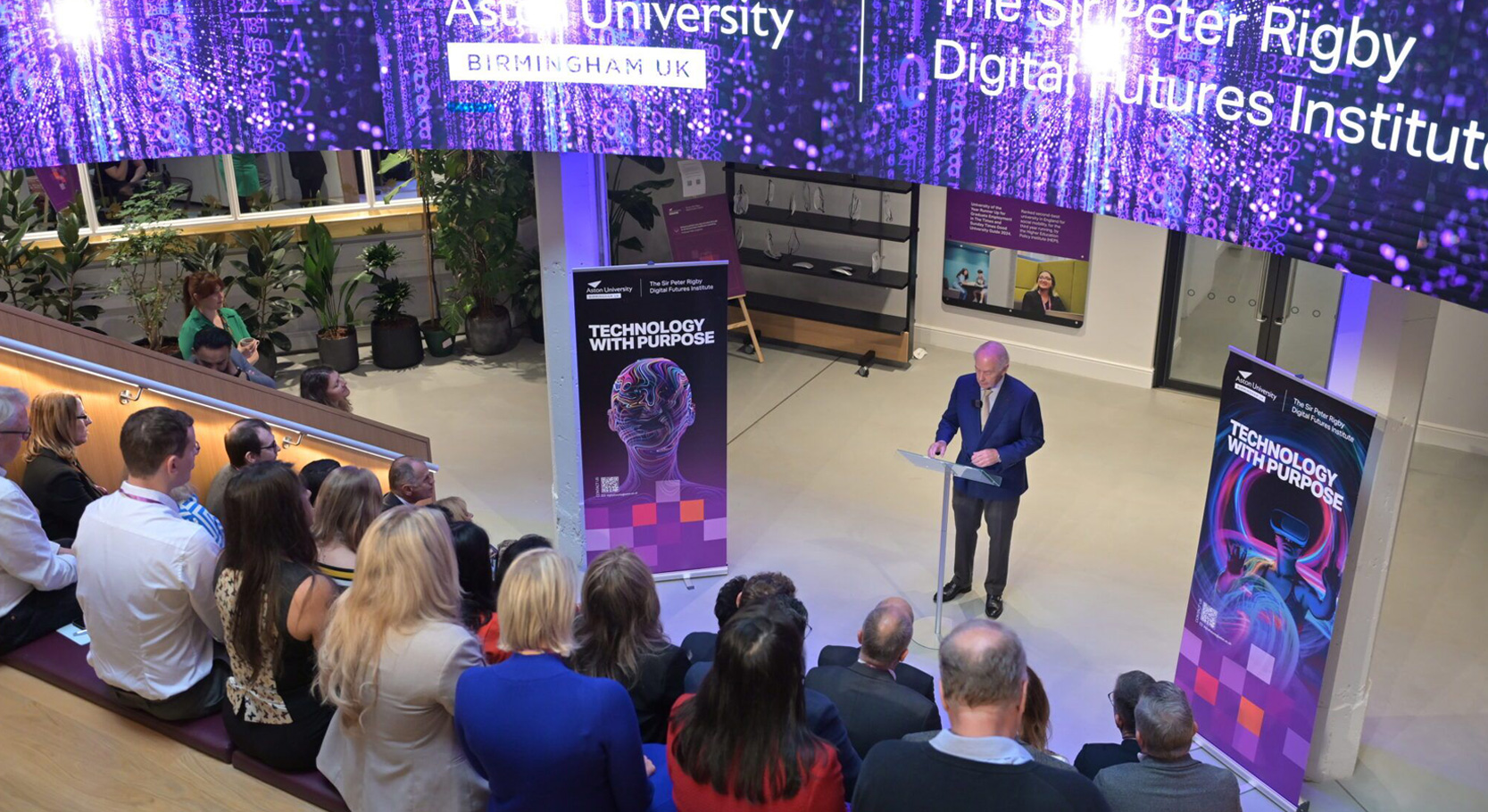
Sir Peter Rigby Digital Futures Institute launched at Aston University
11 Oct 2024
This month (October 2024), saw the launch of the Sir Peter Rigby Digital Futures Institute at Aston University, which has been established to accelerate technological innovation by bridging the gap between academic research and industry application. Funded by The Sir Peter Rigby Charitable Trust the Institute will look to transform cutting-edge concepts into real-world solutions, advancing technology at pace.
The Digital Futures Institute builds on the existing successful partnership between Aston University and Rigby Group’s international technology business, SCC which has already produced significant work in medical and patient care applications and the use of AI to fight cybercrime.
Located in Birmingham's Knowledge Quarter, the Digital Futures Institute will also contribute to the economic revitalisation of Birmingham and the West Midlands.
At the launch, Sir Peter Rigby highlighted the importance of academia-industry collaboration:
“Today marks a significant milestone not just for me but for all of us who share a vision of a future where academia and industry work together to get transformative projects into business and life in a positive way.
Here, in Birmingham's Knowledge Quarter, we stand at the threshold of a new era with the launch of the Digital Futures Institute.
Reflecting on my professional journey, which began right here in Birmingham, building a large international technology business from the ground up has instilled in me a deep appreciation for innovation and of the communities we serve. It is in this vibrant city that I learned the value of perseverance and the impact of technology on society. This institute is not only a testament of our shared history but also a beacon of our potential future.
I extend my heartfelt gratitude to Aston University for their steadfast partnership and to all the stakeholders and supporters who have turned this vision into reality. Your commitment mirrors the collaborative spirit that this institute embodies.
This endeavour is deeply personal to me. It represents a confluence of my life’s work and my aspirations for our community. The partnership between my principal business, SCC, and Aston University is a manifestation of our collective commitment to harness digital technology for the betterment of society. This is exemplified by work conducted to date in medical and patient care applications and, for example, in the application of AI to fighting cyber crime.
First, allow to me tell you a little bit more about SCC and to put the company in context with this partnership.
For the last 50 years and indeed today SCC works on an international basis within the private sector, businesses medium scale to large, in numerous areas including finance, manufacturing, distribution, energy, communications, retail, and numerous other sectors.
In the public sector SCC works with both national and local organisations specifically in health, education, law enforcement, transportation, defence and intelligence services to provide technology and associated services and support.
We partner with the global leaders in software and hardware development and have an eye on young, innovative, entrants to our arena of operations.
To best illustrate SCC’s capabilities by example, SCC France through this summer has delivered the Information Technology behind the 2024 Paris Olympics and 2024 Paris Paralympics. It has done this securely, effectively, professionally, to the largest global audience ever – a project which was some 18 months in the making in terms design, procurement, deployment, support, and ultimately the recovery and refurbishment involving some 90,000 devices and accessories from 120 locations across France and its territories. The physical and cyber-related security considerations, as you can imagine, were considerable and the result was the best Olympics ever in the amazing and secure backdrop of Paris and its satellites.
Something of which I am very proud.
The Digital Futures Institute is founded on two pivotal missions.
First, accelerating Innovation: We aim to bridge the gap between innovative academic research and dynamic industry applications, ensuring rapid advancement from conceptualisation to real-world implementation.
Secondly, having built my business in this city, I am particularly passionate about the role this Institute will play in driving economic growth and revitalising Birmingham and the West Midlands. We are setting the stage to transform our region into a global hub of technology and innovation.
Technology is both a catalyst and cornerstone in shaping our world, redefining how we connect, learn, and conduct business. Its transformative power spans across geographical boundaries and societal norms, offering immense benefits such as advancements in healthcare, enhanced communication, and democratised access to information. These innovations enrich lives and drive global progress.
The Digital Futures Institute will foster AI and data analytics to enhance profitability and productivity in both the business and public sectors and offer efficient service provision in a wide range of areas, for example health and social care, manufacturing, education, transport, etc. We will also leverage generative AI and bespoke Large Language Models for enhanced customer experiences and automatic asset generation eg diagnostic, financial, and investigation reports, amongst others.
However, with these broad benefits come challenges. Rapid technological advancements introduce issues like cybersecurity threats, job displacement, and data privacy concerns and effects. As we move forward with the Digital Futures Institute, it is crucial that we address these challenges responsibly. We must ensure that technology serves humanity while upholding our values and principles.
For the companies and organisations we support, technological innovation is not just about staying ahead, it’s about fostering resilience and agility in a connected world. This Digital Futures Institute aims to bridge academic research with real-world applications and develop a new generation of ethical technologists equipped to navigate these complexities.
In essence, technology is a multifaceted force - driving progress, economic growth, and social change. As we inaugurate this Institute, let us commit to harnessing technology’s potential responsibly, ensuring its benefits are broadly shared and its impact fully realised.”